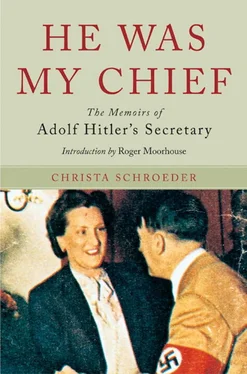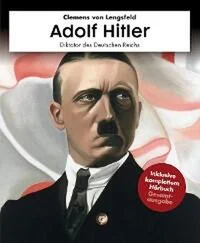Christa Schroeder - He Was My Chief - The Memoirs of Adolf Hitler's Secretary
Здесь есть возможность читать онлайн «Christa Schroeder - He Was My Chief - The Memoirs of Adolf Hitler's Secretary» весь текст электронной книги совершенно бесплатно (целиком полную версию без сокращений). В некоторых случаях можно слушать аудио, скачать через торрент в формате fb2 и присутствует краткое содержание. Город: Barnsley, Год выпуска: 2012, ISBN: 2012, Издательство: Frontline Books, Жанр: История, Биографии и Мемуары, на английском языке. Описание произведения, (предисловие) а так же отзывы посетителей доступны на портале библиотеки ЛибКат.
- Название:He Was My Chief: The Memoirs of Adolf Hitler's Secretary
- Автор:
- Издательство:Frontline Books
- Жанр:
- Год:2012
- Город:Barnsley
- ISBN:978-1-7830-3064-4
- Рейтинг книги:4 / 5. Голосов: 1
-
Избранное:Добавить в избранное
- Отзывы:
-
Ваша оценка:
- 80
- 1
- 2
- 3
- 4
- 5
He Was My Chief: The Memoirs of Adolf Hitler's Secretary: краткое содержание, описание и аннотация
Предлагаем к чтению аннотацию, описание, краткое содержание или предисловие (зависит от того, что написал сам автор книги «He Was My Chief: The Memoirs of Adolf Hitler's Secretary»). Если вы не нашли необходимую информацию о книге — напишите в комментариях, мы постараемся отыскать её.
He Was My Chief: The Memoirs of Adolf Hitler's Secretary — читать онлайн бесплатно полную книгу (весь текст) целиком
Ниже представлен текст книги, разбитый по страницам. Система сохранения места последней прочитанной страницы, позволяет с удобством читать онлайн бесплатно книгу «He Was My Chief: The Memoirs of Adolf Hitler's Secretary», без необходимости каждый раз заново искать на чём Вы остановились. Поставьте закладку, и сможете в любой момент перейти на страницу, на которой закончили чтение.
Интервал:
Закладка:
Over the years Brückner gradually fell into disfavour with Hitler. After a car accident in 1933 at Reit im Winkl when he lost an eye and suffered various fractures, he was on sick leave for a long period. His fiancée Sophie Stork, [25] Sophie ‘Charly’ Stork (b. 5.5.1903 Munich, d. 21.10.1981 Seeshaupt) was introduced to Hitler at Obersalzberg in the spring of 1932. She was a frequent guest at the Berghof and received commissions from Hitler for her hand-crafted ceramics etc. After Brückner broke off the engagement in 1936, according to Schroeder she received from Hitler compensation in the sum of RM 40,000 which caused her many problems with Allied investigators after the war.
a frequent guest at Obersalzberg, who had been a passenger in the car, also suffered serious injuries. Her father owned a noted sporting business in Munich. Sophie was a very talented artist. She painted a coffee service for Eva Braun, made personalised tiles for the pastry area of the new Berghof dining hall and the large hand-crafted ceramic oven in the lounge. Particularly after the accident Hitler took a dim view of Brückner not marrying Sophie Stork and made her a large ex-gratia payment from his own pocket. Brückner, a good-looking man and always the optimist, liked happy, carefree people and had an eye for a pretty woman. Sophie Stork was the jealous type and often let it show, which apparently used to annoy Brückner. When he fell in love with the daughter of the ‘other woman’ cited as a co-respondent in the Magda Quandt divorce◦– before Magda met and married Goebbels◦– Hitler’s displeasure with Brückner grew.
When Brückner brought his Gisela to the Berghof one evening to meet Hitler, the latter gave her a frosty welcome. After dinner, Hitler stopped at the dining room door and said to Brückner: ‘I expect you will be escorting Fräulein Gisela back down into Berchtesgaden tonight?’, which was a serious snub. For more than a decade Brückner had stood at Hitler’s side even in the difficult times, and served him loyally. It came therefore as a severe blow when Hitler dismissed him without ceremony in October 1940 after an intrigue by Kannenberg, the house manager. In occupied France he had the post of city commandant. After a long period of internment after the war he lived for some years after his release at Traunstein where his sergeant from the First World War let him have two small rooms. Possibly Brückner made too light of many things in life but he was a gentleman and his charm created a good atmosphere in Hitler’s entourage. After his dismissal in 1940 Julius Schaub became chief adjutant, but he was no substitute for Brückner.
The demands made of Brückner in the Reich Chancellery were of great importance for those involved, and there was always urgency about the work. Therefore I came under pressure all the time and shuttled assiduously between the NSDAP Liaison Staff and the Reich Chancellery. One day when I was giving Brückner his outgoing mail to sign Hitler came into the room. He stopped, gave me a questioning look and said: ‘Do we know each other?’ I replied, ‘Yes, Herr Hitler, I did some work for you in Munich.’ That had happened one Sunday in 1930. Hitler, coming back from the mountains, had something he wanted to dictate urgently, but Fräulein Frey, who was then his stenotyist, could not be contacted. Herr Hölsken, who worked in Rudolf Hess’s secretarial office, was asked to find an experienced substitute. Remembering my fast typing speed at OSAF he came to my flat and said: ‘Herr Hitler has returned from the mountains and has something he must dictate. His secretary cannot be contacted and I would like you to come with me.’
At the Braunes Haus, Rudolf Hess received me in an ante room and led me to Hitler’s study. It was my first direct meeting with Hitler. He came to me in a friendly manner and said: ‘I am very pleased that you will write for me. It is only a draft and so it will not be important if you make a few typographical errors.’ At that time I did not realise Hitler’s importance and was used to typing dictation directly into the machine so I went ahead without any inhibitions. I must have done the job to his satisfaction for he gave me a box of chocolates as I left. Whenever he met me afterwards in the Braunes Haus he would always acknowledge me in a very friendly way. He had an above-average memory for faces and events, and as a result he remembered me so that soon I was working not only for Brückner but also for Hitler personally whenever he requested it.
On 23 December 1933 upon completing a task for Hitler I requested a signed photograph. I was surprised when he wanted to know my name. Rather taken aback I said, ‘Schroeder!’ ‘No, I know that,’ he replied, ‘I mean your first name.’ When I said in embarrassment that I had an ugly name, Emilie, (Christine is my middle name) he contradicted me: ‘You ought not to say it is an ugly name, it is very beautiful, it was the name of my first sweetheart.’ Naïvely, I happened to mention this to Henriette von Schirach, not suspecting that she would use it without permission in her book Anekdoten um Hitler . [26] Türmer Verlag, 1980.
She inflated this little aside out of all proportion. I record it here not to put matters straight but because Hitler’s remark had the simple interpretation for me that as a young man he had led a normal love life.
Officially as Reich Chancellor, Adolf Hitler had two civil servants at the Chancellery available to him as personal secretaries. These were Fräulein Bügge and Fräulein Frobenius. Perhaps he was put out by the fact that they had done work previously for several of his predecessors and had been employed as secretaries by them. In any case he ignored them completely. In 1930 at the Braunes Haus Hitler had used as his secretary Fräulein Herta Frey (later married as Oldenburg) from Hess’s Chancellery, and from 1931 or 1932 Johanna Wolf who had been in the NSDAP Gau of Lower Bavaria and worked for Hitler’s mentor Dietrich Eckart in 1923 until his death that year. The two private secretaries Fräulein Wolf and Fräulein Wittmann whom he employed in 1933 had no office space in the Reich Chancellery and worked a roster between themselves of four weeks in Munich with Rudolf Hess and four weeks in Berlin at Hitler’s private chancellery run by Albert Bormann from outside the Reich Chancellery.
Albert Bormann had been introduced by his brother Martin into the SA-Hilfskasse insurance scheme in 1931, from where he graduated into Hitler’s private chancellery under Rudolf Hess, and took over running it from 1933. That same year he married a woman of whom brother Martin disapproved because she was not Nordic, and the two brothers became estranged. If they were standing together, each would ignore the other. If for example Hitler gave one of them a job to pass to the other, that brother would send for an orderly officer to convey the instruction to his brother standing a few feet away. If one of the brothers told a funny story everybody present would laugh except the other brother who would keep a straight face. When Albert Bormann divorced after a few years and married his ex-wife’s cousin, he wanted to inform his brother of the fact. Martin Bormann refused to receive him with the remark: ‘I don’t care if he marries his grandmother.’
Since I was resident in Berlin and always on call◦– I had only to walk across the Wilhelm-Strasse◦– I was summoned to Hitler’s Reich Chancellery more frequently than Johanna Wolf. Before Hitler could move into his flat in the Radziwill Palace as Reich Chancellor, the old walls had to be renovated. This was especially necessary in the historic Congress Hall where Bismarck had celebrated the now-famous Berlin Congress of 1878. It was also in this hall that Hindenburg had received Hitler and appointed him Reich Chancellor. ‘The old gentleman’, Hitler said, speaking of Hindenburg, had told him on that occasion: ‘Keep to the walls if you can, Herr Hitler, the floor won’t last much longer.’ Accordingly, after his appointment to Reich Chancellor, Hitler had given orders to renovate the old palace. Until the work was completed Secretary of State Lammers made available to him the service flat under the roof of the old Reich Chancellery on the corner of Wilhelm- and Voss-Strasse. I spent a long period shuttling back and forth between the old Reich Chancellery and the Liaison Staff. After the Radziwill Palace was ready the ‘Personal Adjutancy of the Führer and Reich Chancellor’ was housed in a large room next to the so-called Bismarck room, and I moved in as Brückner’s secretary. Most of the time I sat alone looking out on the old park.
Читать дальшеИнтервал:
Закладка:
Похожие книги на «He Was My Chief: The Memoirs of Adolf Hitler's Secretary»
Представляем Вашему вниманию похожие книги на «He Was My Chief: The Memoirs of Adolf Hitler's Secretary» списком для выбора. Мы отобрали схожую по названию и смыслу литературу в надежде предоставить читателям больше вариантов отыскать новые, интересные, ещё непрочитанные произведения.
Обсуждение, отзывы о книге «He Was My Chief: The Memoirs of Adolf Hitler's Secretary» и просто собственные мнения читателей. Оставьте ваши комментарии, напишите, что Вы думаете о произведении, его смысле или главных героях. Укажите что конкретно понравилось, а что нет, и почему Вы так считаете.












